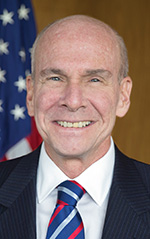Lest We Forget: The Importance of Leadership in a Time of Adversity
The Foreign Service has been through a challenging period, and it may not be the last.
BY P. MICHAEL MCKINLEY
The end of Eric Rubin’s tenure as president of the American Foreign Service Association (AFSA) in July 2023 marks the passing of an era that began with the second term of Barbara Stephenson’s presidency in 2017. It is difficult to think of an equivalent time since the 1950s when the Foreign Service has faced so many sustained challenges on multiple fronts, or so needed the courageous and principled leadership Stephenson and Rubin provided, supported by a dedicated team of professionals at AFSA.
Every member of the career Foreign Service community owes them a personal debt of gratitude for speaking out and defending our profession in a politically charged environment targeting the Foreign Service. As proposals for a new Schedule F intended to eviscerate the federal bureaucracy gain wider currency, and as presidential candidates again threaten to dismantle the “deep state,” it is important not to take for granted what AFSA leaders fought for on our behalf. They set an example for how the Foreign Service may again need to respond in the not-so-distant future.
Challenging Times
To say that Stephenson and Rubin worked in challenging times is to understate what they faced. The assault launched on the State Department in 2017 continued in different ways through 2020. Both Senior Foreign Service officers and former ambassadors, they may have anticipated a difficult moment, but nothing quite like what they confronted.
The administration request for foreign affairs agencies for the Fiscal Year 2018 budget included 29 percent in cuts. Although Congress ultimately rejected these cuts, the administration proceeded to freeze hiring and slash staffing, creating severe operational pressures at embassies overseas and at the department. Senior leadership was decimated, with more than 100 senior officers forced out or resigning. The freeze on promotions, employee family member positions, and new entry classes was followed by political harassment, the targeting of officers during the Ukraine scandal, and a decline in diversity and gender representation at the senior level. Secretaries of State distrusted the building. An Orwellian banner proclaiming a new State Department ethos was unveiled at the C Street entrance.
Much of this might have seemed like a rougher version of the give-and-take that can govern changes in administrations. Stephenson and Rubin recognized that something fundamentally more threatening was underway and took on the challenge of responding on behalf of the Foreign Service family.
They used The Foreign Service Journal’s President’s Views column to inform the broader membership of critical developments; they engaged Seventh-Floor management on difficult issues; they highlighted the importance of diplomacy on Capitol Hill and in the media; and, when they had to, they spoke out against measures and actions threatening the integrity and viability of the Foreign Service.
The Early Onslaught
Ambassador Stephenson faced the early onslaught. She spoke out, at risk to her own career and standing with State Department leadership. She argued against the personnel cuts and cuts to investments in the building. Most of this was done, necessarily, behind closed doors. She met with Deputy Secretary John Sullivan, a political appointee, to preserve critical programs like the Pickering and Rangel Fellowships. She pointed out the damage to the department’s diversity in senior leadership occasioned by the departure of the most senior female, Black, Hispanic, and Asian American officers. She helped rally support on the Hill to oppose funding cuts and demand—in legislation—a halt to staffing cuts.
Stephenson’s December 2017 President’s Views column, “Time to Ask Why,” was a direct challenge to “the mounting threats to our institution—and to the global leadership that depends on us.” She drew attention to the fact that “our leadership ranks are being depleted at dizzying speed,” adding: “Were the U.S. military to face such a decapitation in its leadership ranks, I would expect a public outcry.” She closed with an overt challenge: “Where is the mandate to pull the Foreign Service team from the field and forfeit the game to our adversaries?”
The assault launched on the State Department in 2017 continued in different ways through 2020.
She had sounded the alarm; by then no one inside the building was speaking out. It was becoming clear what happened to public servants who raised concerns—at State, at Justice, at Education, at EPA, and elsewhere. In subsequent months, Stephenson faced pressure from the Seventh Floor and met closed doors when she sought to raise new concerns. Her second term ended in summer 2019, and she retired from the Foreign Service, which by then was collectively wondering what else could happen.
Navigating the Ukraine Scandal
Ambassador Eric Rubin took over in July 2019. He was intent on addressing the bread-and-butter issues of most concern to the Foreign Service community. A month later, however, the Ukraine scandal hit. And, like Stephenson’s second tenure, Rubin’s first was dominated by an ever-more-politicized environment, where senior leadership increasingly viewed the Foreign Service in terms of “us vs. them.”
His challenge was how to navigate the Ukraine scandal, which involved the White House and career officials. The moment was existential for the Foreign Service because the president of the United States threatened a U.S. ambassador with retribution and sought to extort a foreign country for domestic political gain.
Rubin became a go-to person for members of the Foreign Service who felt the brunt of declining diversity and had experienced political targeting by the White House as well as by appointees inside the building. For many, Rubin and his team’s biggest achievement was to take on the department’s effort to limit assistance for the significant legal costs of colleagues caught up in the Ukraine scandal. AFSA won the battle to reimburse members’ legal bills, raising more than $750,000 from the generosity of the wider foreign affairs family. Like Stephenson, Rubin faced personal blowback from the Seventh Floor for the stands he took.
The Ukraine scandal cast a pall over the department and made almost impossible demands on AFSA. Rubin used his wider messages to convey the seriousness of the moment, pointedly asking whether the gains of professionalism, diversity, and merit-based appointments were in danger “in the context of a highly polarized political environment.” In 2020 he forthrightly stated: “This is the most fraught time and the most difficult time” for the State Department since the 1950s, when McCarthyism targeted dozens of officers as suspected communists and hundreds more lost their employment simply because they were gay.
Moving On
When there was a change in administration in 2021, Rubin and the AFSA staff conveyed to a new Seventh Floor how deep the damage had been to the institution, as well as pointing to the game-changing impact of the COVID-19 pandemic on the workplace and families. They highlighted the importance of rebuilding budgets, providing bureaucratic safeguards, and empowering members of the Foreign Service to do their job.
The dangers of a renewed attack on the integrity of the State Department have not vanished. If anything, they are growing. Former Ambassador Dennis Jett, in an important article in the January-February 2023 FSJ, detailed just how alarming the proposal for a Schedule F is. It is generating significant political support, including from leading presidential candidates and think tanks. If enacted, it would provide the legal basis for dismissing thousands of civil servants perceived as disloyal by a new administration.
Belatedly, the Office of Personnel Management is proposing to strengthen protections for the federal bureaucracy. It needs to: unless it does, the Civil Service The Washington Post describes as “one of the country’s greatest assets,” which includes the professional Foreign Service Ambassadors Barbara Stephenson and Eric Rubin worked so hard to protect, could again be under threat in a future administration. And AFSA’s leadership will be defending it from a much-weakened institutional foundation.
When sharing or linking to FSJ articles online, which we welcome and encourage, please be sure to cite the magazine (The Foreign Service Journal) and the month and year of publication. Please check the permissions page for further details.
Read More...
- “Diplomacy Needs Diplomats,” by Shawn Dorman, The Foreign Service Journal, December 2017
- “Straight Talk on Diplomatic Capacity” by Alex Karagiannis, The Foreign Service Journal, May 2018
- “The Diplomat and the State,” Christopher W. Smith, The Foreign Service Journal, May 2020




